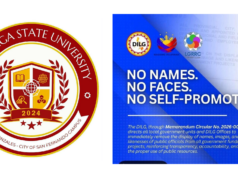An empty highway in the City of San Fernando. Photo courtesy of Bong Lacson
CITY OF SAN FERNANDO — Five weeks into the enhanced community quarantine, the country still continues to mitigate and fight the relentless battle against Covid-19 pandemic, and so is the rest of the world.
In a statement released by the World Health Organization (WHO) on April 16, on the transition to a ‘new normal’ during the Covid-19 pandemic, Dr. Hans Henri P. Kluge, WHO regional director for Europe, said that to consider a transition, we must acknowledge that there are no ‘quick wins’ as we are entering a period where we may need to rapidly adjust measure and gradually ease restrictions while constantly monitoring the effectiveness of these actions and the response of the public.
According to WHO, any steps to transition towards a ‘new normal’ must be guided by public health principles, together with the economic and societal considerations as the public behaviour will also determine the behaviour of the virus since there is no fast-track to going back to normal.
These are the six steps, released by WHO, as guided principles to transition into the “new normal”
-
That evidence shows COVID-19 transmission is controlled;
-
That public health and health system capacities including hospitals are in place to identify, isolate, test, trace contacts and quarantine them;
-
That outbreak risks are minimized in high-vulnerability settings – particularly in elderly homes, mental health facilities and people residing in crowded places;
-
That workplace preventive measures are established – with physical distancing, handwashing facilities, respiratory etiquette in place;
-
That importation risks can be managed; and
-
That communities have a voice and are engaged in the transition.
Kluge said if countries do not have adequate all-of-society and all-of-government preparedness and response strategies in place — untrained, unequipped, and unprotected health workforce and lack of information to all its citizens, the pandemic will sweep through its communities, businesses and health systems, taking lives and livelihoods with it.
“Solidarity is key here, between the health authorities and Covid-19 response leads in the respective countries,” Kluge said. “If you cannot ensure these criteria are in place, before easing restrictions, please re-think.”
To date, the Philippines now has a total of 6,599 confirmed cases with 654 recoveries, 437 deaths and with 140 new cases being the lowest number of new recorded cases since April 11.





